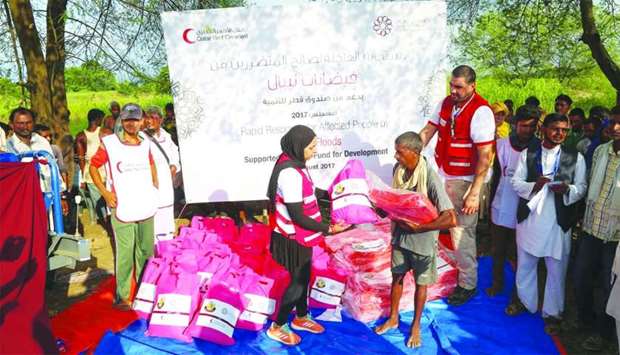Qatar Red Crescent (QRCS) has initiated a quick response to the humanitarian crisis affecting Nepal due to sweeping floods and subsequent landslides.
With funding from Qatar Fund for Development (QFFD), $240,000 was dedicated to the initial intervention in shelter, hygiene, and health care for the benefit of 4,000 families (20,000 people).
At the same time, QRCS's Disaster Information Management Centre (DIMC) was activated for gathering real-time information and making assessments. On Thursday, a relief team from QRCS traveled to Nepal to conduct the first phase of response.
Upon their arrival, they communicated with government authorities, the Nepal Red Cross Society (NRCS), and local charities. The team is receiving “extraordinary backing” from Qatar ambassador to Nepal Yousef Ahmed al-Hail.
QRCS's team visited some of the worst-affected districts of southwestern Nepal, where more than 95,000 families were displaced and their houses were totally destroyed. The team distributed relief kits to 500 families and started an assessment in preparation for the next phase of response.
The team will move to southeastern districts on Sunday to deliver relief to additional 500 families. This three-month phase of intervention involves cooperation with Nepalese authorities and NRCS.
The Asian country has recently been ravaged by monsoon floods with a toll of 111 killed, 21 missing, hundreds injured, 9,000 families affected, and 1,200 houses damaged.
Thousands of families are trapped in the floods, which blocked access of aid to the stricken parts of the country. According to Nepal Centre for Disaster Management, a government body, the number of towns and villages hit by floods and landslides is estimated at more than 2,000.
The populations of these areas are at risk of displacement, especially as the monsoon rains are expected to continue for weeks. Emergency shelter (tents, tarpaulins, blankets, and mattresses) and hygiene kits are the top priorities of relief at the time. Operations will be scaled up in the following second phase.
QRCS has been active in Nepal since 2013, with many projects in water, sanitation, and health care. Through its office opened in April 2015, QRCS was among the first responders to the 2015 Earthquake, offering support in healthcare, water and sanitation, food and non-food items, and power generators, which helped more than 50,000 people.

